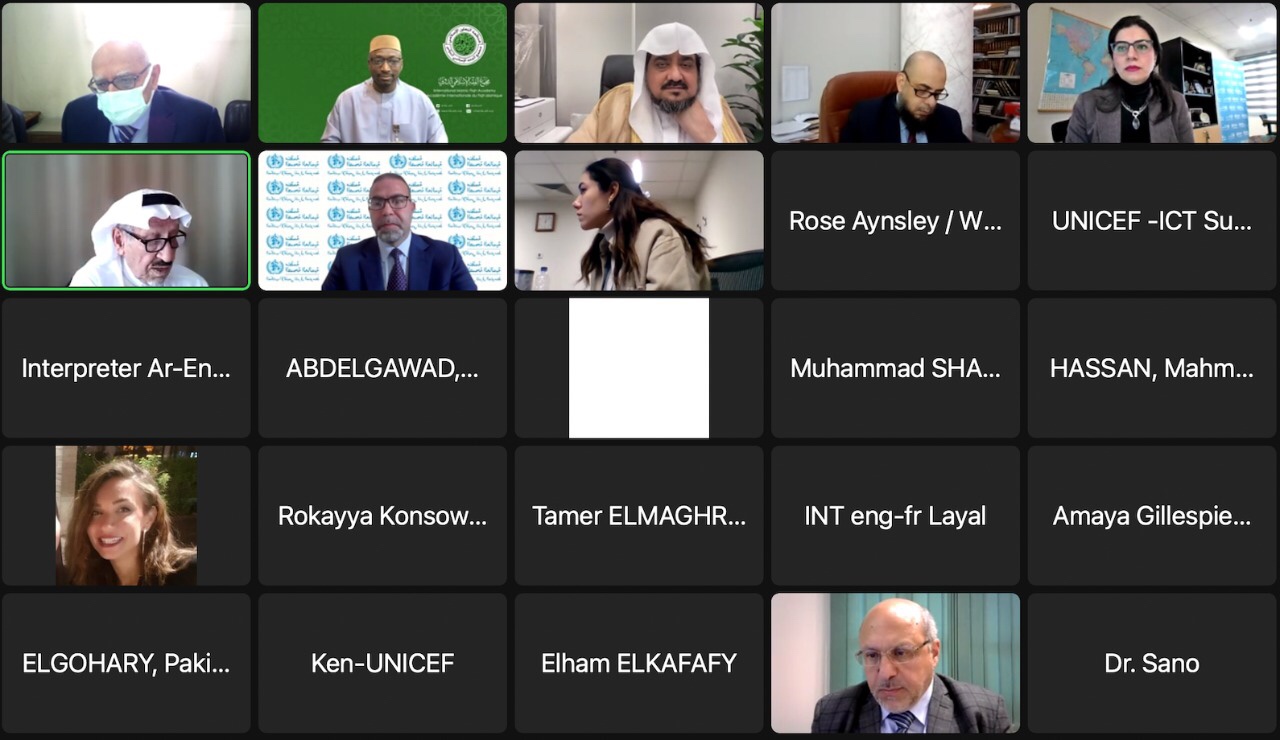
On Tuesday, 12 Sha’ban 1443H corresponding to 15 March 2022G, the Islamic Advisory Group held a virtual video discussion on safe practices during the holy month of Ramadan with the participation of scholars from the International Islamic Fiqh Academy (IIFA), Al-Azhar al-Sharif, doctors, and specialists from the World Health Organization (WHO), the Regional Office for the Middle East, UNICEF, the Red Crescent, and the International Red Cross.
The Organizing Committee started the discussion by submitting a detailed report on the state of the emerging CORONA pandemic, praising the efforts of various regional and international health organizations to combat the pandemic.
His Excellency Prof. Koutoub Moustapha Sano, Secretary General of the Academy, spoke about the role of Shariah in protecting the health of the individual and society in general and during the holy month of Ramadan with the presence of the Corona pandemic in particular. He started with the point that the term “Shariah” does not need to add the word “Islamic” to it, because Shariah means all the provisions prescribed by God whether they are belief systems, practical provisions or ethics, these provisions are all Islamic, as these provisions cannot be un-Islamic, which means that there is no non-Islamic law! Accordingly, the addition of the word “Islamic” to the term “Sharia” was a misnomer and a common mistake.
His Excellency then showed that the Shariah is meant to protect the individual and society in their religions, their family, their wealth, and their intellect. The preservation of these values is one of the necessary pillars on which life depends. His Excellency also stressed that preservation of life is the first and most important of these five necessities. Therefore, efforts should be concerted in protecting them by adhering to instructions issued by the world’s specialized health authorities. His Excellency also warned that the holy month of Ramadan is one of the most important occasions to be used to protect oneself and tame it in a distinct style of diet of reducing eating and drinking in quantity and quality.
This means that the month of Ramadan is an opportunity to get rid of excess weights by reducing foods and beverages, to get rid of cholesterol, fats, and other substances harmful to health. In the meantime, His Excellency pointed to the bad habits that many of us are involved in during the month of Ramadan where the demand for markets and shops is increasing, and the demand for large quantities of food in this holy month is increasing. This is undoubtedly in stark contravention of the supreme Shariah purpose of the month of Ramadan of the need for a Muslim to feel the difficult living conditions of the poor and destitute who have nothing to eat and drink. His Excellency therefore called for a review of this custom and its replacement with redoubling charity, kindness to the poor and needy in this month, as well as the need to consume less food and drink.
His Excellency then addressed the importance of adhering to all health instructions and precautions issued by the authorities responsible for combating the CORONA pandemic in the world, stressing that the pandemic still exists in our midst until this moment, as the World Health Organization has not announced its end. Therefore, we must join forces to continue to combat this pandemic and get rid of it by respecting the instructions, precautions, and requirements, stressing that the responsible commitment to the safer practices mentioned in the food, drink and health instructions adopted would achieve the purpose of self-preservation, and the application of the rule of “neither harm nor be harmed”.
His Excellency concluded his intervention by calling on all Muslims around the world to respect all other instructions, precautions and requirements issued by the health authorities in their individual countries, as an act of obedience to God and his Messenger, peace be upon him, and to the leaders.
On the other hand, the panel discussion was attended by His Eminence Dr. Mohammed Mustafa Shoaib, supervisor of the Observatory of Fatwa and Reviews at the Academy. He addressed the topic of “Fatwas and resolutions of the International Islamic Fiqh Academy on access to vaccines in Ramadan, and the legalization of Covid-19 vaccines and their importance in Islamic law”, and His Eminence Dr. Abdul Qahir Qamar, Director of the Department of Research, Studies, Encyclopedias, Translation and Printing and a member of the Executive Committee of the Islamic Advisory Group, also delivered a speech on “the importance of adhering to preventive measures during the month of Ramadan and Eid al-Fitr, and facilitating the access of fasters to vaccines during the holy month”.
Participants in the seminar from Al-Azhar al-Sharif included His Eminence Prof. Ibrahim Al-Hodhod, former President of Al-Azhar University, His Eminence Prof. Abdullah Mabrouk Al-Najjar, member of the Islamic Research Academy and member of the Academy, and His Excellency Dr. Jamal Abu Al-Sorour, Director of the International Islamic Center for Population Studies and Research at Al-Azhar University, member of the Executive Committee of the Islamic Advisory Group.
The discussion was moderated by H.E. Dr. Yacoub Al Mazroui, Chairman of the Executive Committee of the Islamic Advisory Group, and the panel was characterized by a wealth of up-to-date information and useful suggestions, and at the end of which, time was devoted to answering questions from followers from international organizations and viewers from around the world.
It should be noted that the General Secretariat of the Academy issued a fatwa (juristic verdict) on the possibility of taking vaccines available against Covid-19 and the skin and muscle injections of the fasting person on the day of Ramadan, in response to a clarification from the Executive Committee of the Islamic Advisory Group, which will be distributed to states, ministries of health, health organizations and official bodies in the Member States of the Organization for Islamic Cooperation (OIC).
Read Also
Lastest








